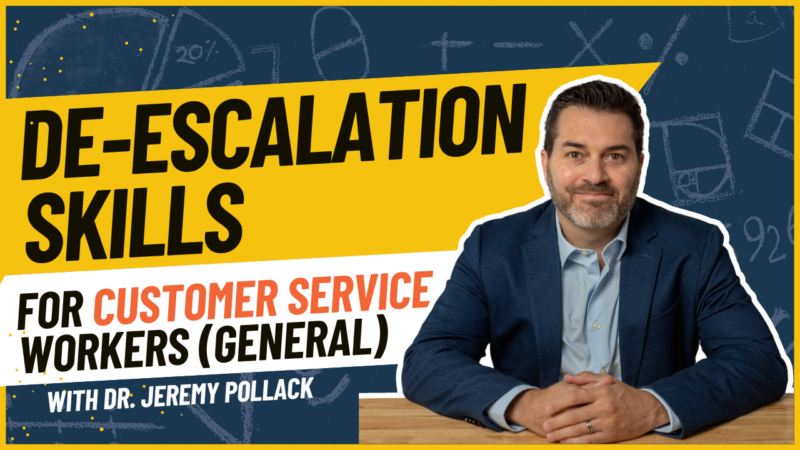Table of content
Conflict is an inevitable part of human interaction, especially in professional settings where individuals bring diverse perspectives, stressors, and emotions. While some conflicts can be resolved through calm discussions, others may escalate into heated verbal confrontations.
The Verbal Escalation Continuum, a concept rooted in de-escalation training, offers a systematic approach to understanding and managing these situations effectively. By recognizing the stages of escalation and implementing targeted strategies, professionals can prevent conflicts from spiraling out of control.
In this blog, we will explore the stages of the Verbal Escalation Continuum, effective strategies in the de-escalation process, how Defuse De-escalation Training equips teams with critical skills, and ways to incorporate these insights into daily conflict management.
Understanding the Stages of the Verbal Escalation Continuum
The Verbal Escalation Continuum provides a structured framework for identifying and responding to escalating verbal behaviors. By understanding examples of escalating situations, professionals can recognize each stage as a progression in conflict intensity, enabling them to intervene appropriately.
Stage 1 – Questioning
The first stage involves questioning, which can take two forms: information-seeking questions and challenging questions.
Information-seeking questions are typically neutral or constructive, such as, “Why are we implementing this policy?” These inquiries reflect curiosity and a desire for clarification. However, challenging questions-like, “Who made you the boss?”-are confrontational and can signal the onset of a power struggle.
At this stage, responding with calm validation can make a significant difference. For example, acknowledging the question and refocusing on the issue can prevent escalation. As the Crisis Prevention Institute (CPI) suggests, maintaining objectivity and avoiding counterarguments is crucial.
Stage 2 – Refusal
When questioning escalates, individuals may begin refusing instructions or directives. Refusal is often characterized by statements like, “I am not doing that” or “They cannot force me.” Resistance at this stage may stem from underlying frustration, mistrust, or a need for autonomy.
Staff trained in de-escalation techniques are encouraged to offer choices, maintain a respectful tone, and avoid pushing too hard. The following role-playing exercises can help prepare teams to handle refusals calmly and constructively:
- Scenario 1: Challenging Authority in a Group Setting
- One participant plays a team member challenging instructions (e.g., “Why should I listen to you?”), while others role-play as colleagues attempting to de-escalate.
- Scenario 2: Resolving Refusal in a Healthcare Setting
- In a simulation, a “patient” resists instructions from “staff” (e.g., refusing to attend a session). The staff members practice using empathetic language and offering choices like, “Would you like to discuss this here, or should we step aside for privacy?”
Stage 3 – Release
In the release stage, emotions take over, leading to verbal outbursts, shouting, or venting frustrations. This stage is often fueled by pent-up anger or a sense of injustice. Phrases like, “You never listen to me!” or “I hate this place!” are common.
De-escalation at this level involves active listening, maintaining non-confrontational body language, and allowing individuals to vent without interruption. Recognizing the cathartic nature of venting can help diffuse tension and create space for dialogue.
Stage 4 – Intimidation
When verbal escalation reaches the intimidation stage, it is critical to prioritize safety. Intimidation may involve verbal threats, aggressive posturing, or physical proximity meant to unsettle others. Examples include statements like, “You better watch your back.”
Workers are advised to create physical distance, avoid counter-threats, and, if necessary, involve additional support or security protocols.
Stage 5 – Tension Reduction
After reaching a peak, most conflicts transition into the tension reduction stage. Here, individuals may exhibit remorse, calm down, or seek reconciliation. This stage provides an opportunity for constructive dialogue and resolution.
Encouraging apologies and offering reassurances are essential in fostering trust and ensuring lasting resolutions. Post-conflict discussions allow teams to reflect and strengthen their de-escalation skills.
Strategies for Lowering Stress and Tension During Confrontations
Managing stress during confrontations requires a combination of emotional intelligence, situational awareness, and practical skills. Here are some proven strategies:
Active Listening
Active listening is a cornerstone of de-escalation. By paying attention, acknowledging emotions, and encouraging open dialogue, professionals can help individuals feel heard. Techniques such as paraphrasing and maintaining eye contact reinforce understanding and empathy.
Non-Confrontational Communication
The tone of voice, body language, and choice of words significantly influence conflict dynamics. Keeping a calm tone, avoiding accusatory language, and adopting an open posture can prevent further escalation. Simple gestures like nodding affirmatively signal cooperation and respect.
Addressing Triggers
Every individual has unique triggers that can exacerbate tensions. Identifying and addressing these triggers early can effectively de-escalate conflicts. For instance, avoiding known stressors and offering alternatives can mitigate frustrations.
How Defuse Equips Teams with the Skills Needed for Effective De-Escalation
At Defuse, we specialize in empowering teams with the tools they need to handle high-stress situations confidently. Our training programs are designed to address the complexities of verbal escalation across various industries.
Tailored Training Programs
We customize our de-escalation training to meet the unique needs of industries like healthcare, customer service, and education. Our hands-on exercises simulate real-life scenarios, helping participants build practical skills.
Evidence-Based Techniques
Defuse incorporates proven methodologies to teach professionals how to recognize and respond to escalating behaviors. By grounding our training in research, we ensure that participants gain verbal de-escalation strategies that work in real-world settings.
Continuous Support and Resources
We believe in ongoing learning. Our clients have access to resources, workshops, and refresher courses that reinforce their de-escalation skills over time. By fostering a culture of empathy and preparedness, we help organizations create safer, more respectful workplaces.

Incorporating the Continuum Into Everyday Conflict Management
The Verbal Escalation Continuum can be seamlessly integrated into daily interactions to build stronger relationships and reduce workplace stress.
- Practice Makes Perfect: Regular practice of de-escalation techniques ensures readiness. Role-playing exercises and team discussions can help employees internalize key skills, making them second nature during conflicts.
- Cultivate a Culture of Respect: Organizations that prioritize respectful communication and proactive conflict resolution foster trust and collaboration. This cultural shift reduces the likelihood of escalation, creating a more harmonious work environment.
- Empower Teams Through Training: By investing in de-escalation training with Defuse, teams gain the confidence to navigate conflicts effectively. The benefits of de-escalation training include equipping professionals with the skills to de-escalate tensions, foster safer environments, and maintain productive relationships.
Turn Conflict Into Collaboration
The Verbal Escalation Continuum is a powerful framework for understanding and managing conflicts. By recognizing its stages, employing stress-reduction strategies, and leveraging expert training from Defuse De-escalation Training, organizations can transform challenges into opportunities for growth. Contact us today to learn more about how our de-escalation programs can benefit your team.




